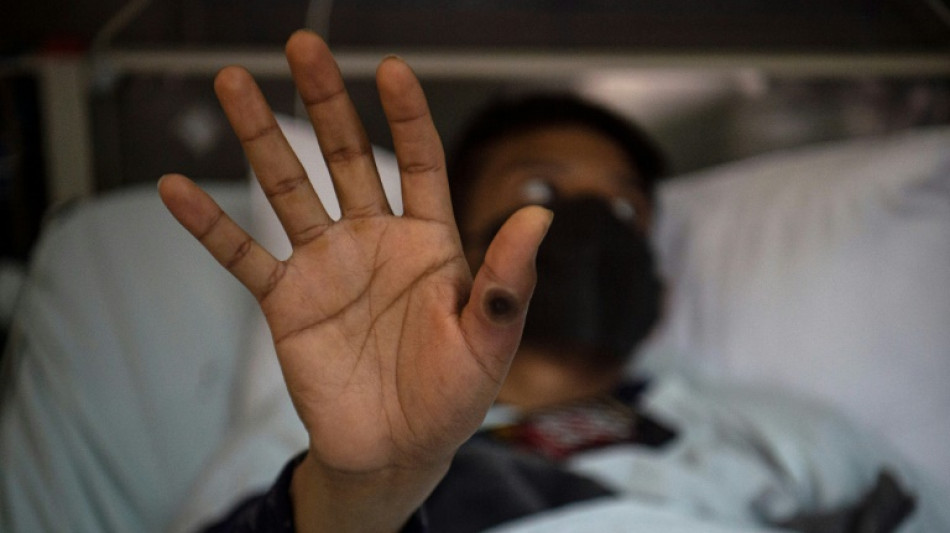
-
 UN climate chief urges G20 to spur tense COP29 negotiations
UN climate chief urges G20 to spur tense COP29 negotiations
-
Philippines warns of 'potentially catastrophic' Super Typhoon Man-yi

-
 Tens of thousands flee as Super Typhoon Man-yi nears Philippines
Tens of thousands flee as Super Typhoon Man-yi nears Philippines
-
Gabon votes on new constitution hailed by junta as 'turning point'

-
 Tens of thousands flee as Typhoon Man-yi nears Philippines
Tens of thousands flee as Typhoon Man-yi nears Philippines
-
Is Argentina's Milei on brink of leaving Paris climate accord?

-
 Fitch upgrades Argentina debt rating amid economic pain
Fitch upgrades Argentina debt rating amid economic pain
-
Trump picks Doug Burgum as energy czar in new administration

-
 At summit under Trump shadow, Xi and Biden signal turbulence ahead
At summit under Trump shadow, Xi and Biden signal turbulence ahead
-
Xi warns against 'protectionism' at APEC summit under Trump cloud

-
 Xi, Biden at Asia-Pacific summit under Trump trade war cloud
Xi, Biden at Asia-Pacific summit under Trump trade war cloud
-
Leftist voices seek to be heard at Rio's G20 summit

-
 Boeing strike will hurt Ethiopian Airlines growth: CEO
Boeing strike will hurt Ethiopian Airlines growth: CEO
-
US retail sales lose steam in October after hurricanes

-
 Spate of child poisoning deaths sparks S.Africa xenophobia
Spate of child poisoning deaths sparks S.Africa xenophobia
-
Comedian Conan O'Brien to host Oscars

-
 Gore says 'absurd' to hold UN climate talks in petrostates
Gore says 'absurd' to hold UN climate talks in petrostates
-
Global stocks struggle after Fed signals slower rate cuts

-
 China tests building Moon base with lunar soil bricks
China tests building Moon base with lunar soil bricks
-
Oil execs work COP29 as NGOs slam lobbyist presence

-
 Gore says climate progress 'won't slow much' because of Trump
Gore says climate progress 'won't slow much' because of Trump
-
'Megaquake' warning hits Japan's growth

-
 Stiff business: Berlin startup will freeze your corpse for monthly fee
Stiff business: Berlin startup will freeze your corpse for monthly fee
-
Dominican Juan Luis Guerra triumphs at 25th annual Latin Grammys

-
 Tropical Storm Sara pounds Honduras with heavy rain
Tropical Storm Sara pounds Honduras with heavy rain
-
TikTok makes AI driven ad tool available globally

-
 Japan growth slows as new PM readies stimulus
Japan growth slows as new PM readies stimulus
-
China retail sales pick up speed, beat forecasts in October

-
 Pakistan's policies hazy as it fights smog
Pakistan's policies hazy as it fights smog
-
Mexico City youth grapple with growing housing crisis

-
 Cracks deepen in Canada's pro-immigration 'consensus'
Cracks deepen in Canada's pro-immigration 'consensus'
-
Japan's Princess Mikasa, great aunt to emperor, dies aged 101

-
 Venezuela opposition activist dies in custody
Venezuela opposition activist dies in custody
-
Policymakers defend Fed independence amid concerns about Trump era

-
 Lebanon economic losses top $5 billion in year of clashes: World Bank
Lebanon economic losses top $5 billion in year of clashes: World Bank
-
Fed Chair calls US the best-performing major economy in the world

-
 Brother of late Harrods owner also accused of sexual violence: BBC
Brother of late Harrods owner also accused of sexual violence: BBC
-
New York to revive driver congestion charge plan, drawing Trump ire

-
 China's Xi arrives in Peru for APEC summit, Biden meeting
China's Xi arrives in Peru for APEC summit, Biden meeting
-
Spain's Vanguardia daily to stop posting on 'disinformation network' X

-
 New York to revive driver congestion charge plan
New York to revive driver congestion charge plan
-
US stocks wobble as traders weigh future Fed cuts

-
 BHP, Vale cleared by Brazil court over 2015 dam disaster
BHP, Vale cleared by Brazil court over 2015 dam disaster
-
Legal migration to OECD reaches new record in 2023

-
 Central bank independence 'fundamental' for good policy: Fed official
Central bank independence 'fundamental' for good policy: Fed official
-
EU fines Meta $840 million for 'abusive' Facebook ad practices

-
 Iran tells UN nuclear chief willing to resolve 'ambiguities'
Iran tells UN nuclear chief willing to resolve 'ambiguities'
-
Coach owner Tapestry calls off Capri bid on regulatory blocks

-
 EU fines Meta 798 mn euros for Facebook ad antitrust breach
EU fines Meta 798 mn euros for Facebook ad antitrust breach
-
'Terrible' AI has given tech an existential headache: activist


WHO warns more mpox to come in Europe after case in Sweden
The WHO on Thursday warned further imported cases of the new, more dangerous mpox strain in Europe were likely, after Sweden announced the first such infection outside Africa in an outbreak that has killed hundreds in the DR Congo.
The case recorded in a traveller in Sweden was announced the day after the World Health Organization declared the mpox surge in Africa a public health emergency of international concern -- the highest alarm it can sound.
The UN health agency was concerned by the rise in cases and fatalities in the Democratic Republic of Congo, and the spread to Burundi, Kenya, Rwanda and Uganda.
Sweden's Public Health Agency told AFP on Thursday that it had registered a case of the Clade 1b subclade -- the same new strain of the virus that has surged in the DRC since September 2023.
"A person who sought care" in Stockholm "has been diagnosed with mpox caused by the clade 1 variant. It is the first case caused by clade I to be diagnosed outside the African continent," the agency said in a separate statement.
The person was infected during a visit to "the part of Africa where there is a major outbreak of mpox Clade 1", state epidemiologist Magnus Gisslen said in the statement.
The agency added: "The fact that a patient with mpox is treated in the country does not affect the risk to the general population, a risk that the European Centre for Disease Prevention and Control (ECDC) currently considers very low."
The WHO's European regional office in Copenhagen said it was discussing with Sweden how best to manage the newly detected case.
"The confirmation of mpox Clade 1 in Sweden is a clear reflection of the interconnectedness of our world," it said in a statement.
"There are likely to be further imported cases of Clade 1 in the European region over the coming days and weeks, and it is imperative that we don't stigmatise travellers or countries/regions."
"Travel restrictions and border closures don't work and should be avoided," it added.
- 548 deaths in DRC -
The outbreak has centred on the DR Congo.
Health Minister Samuel-Roger Kamba said in a video message that the country "has recorded 15,664 potential cases and 548 deaths since the beginning of the year", with all 26 provinces affected.
The DRC's population is around 100 million.
He said the government had put in place a "national strategic plan for vaccination against mpox", as well as improving surveillance of the disease at borders and checkpoints.
The minister said government-level working groups have been set up to boost contact tracing and help mobilise resources to "maintain control of this epidemic".
Formerly called monkeypox, the virus was discovered in 1958 in Denmark, in monkeys kept for research.
It was first discovered in humans in 1970 in what is now the DRC.
Mpox is an infectious disease caused by a virus transmitted to humans by infected animals but can also be passed from human to human through close physical contact.
The disease causes fever, muscular aches and large boil-like skin lesions.
- Vaccine drive -
The US Department of Health said Wednesday it would be "donating 50,000 doses of the Food and Drug Administration (FDA)-approved JYNNEOS vaccine to DRC".
"Vaccination will be a critical element of the response to this outbreak," it said in a statement.
And Danish drugmaker Bavarian Nordic said it was ready to produce up to 10 million doses of its vaccine targeting mpox by 2025.
There are two subtypes of the virus: the more virulent and deadlier Clade 1, endemic in the Congo Basin in central Africa; and Clade 2, endemic in West Africa.
In May 2022, mpox infections surged worldwide, mostly affecting gay and bisexual men, due to the Clade 2b subclade.
The WHO declared a public health emergency which lasted from July 2022 to May 2023.
That outbreak, which has now largely subsided, caused some 140 deaths out of around 90,000 cases.
The Clade 1b subclade causes more severe disease than Clade 2b, with a higher fatality rate.
S.F.Lacroix--CPN

